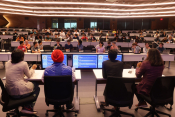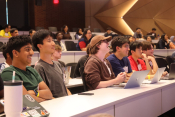UMD Students Explore Startup Resources at Hatchery Kick-Off
The University of Maryland’s Department of Computer Science held its annual Fall Mokhtarzada Hatchery Kick-Off Event on Monday, September 8, 2025, offering students an overview of the department’s incubator for student-led startups. Hosted at the Brendan Iribe Center for Computer Science and Engineering, the event featured presentations about the program with mentors and UMD alums Haroon (B.A. ’01, economics) Idris (B.S. ’10, computer science) and Zeki Mokhtarzada (B.S. ’01, computer science) and Manpreet Singh (B.S. ’03, finance), who discussed how the Hatchery can support students’ entrepreneurial goals.
The program provides up to $10,000 in funding, one-on-one mentorship and workspace to selected student teams developing startup ventures. It supports projects from the conceptual stage through early development and refinement, helping students shape their ideas into market-ready products.
 Backed by the Mokhtarzada brothers, who co-founded and later sold their startup Webs.com for $117.5 million and Truebill for nearly $1.3 billion, the Hatchery is designed to give students firsthand access to entrepreneurial guidance. The brothers meet with participating teams every two weeks to offer feedback, track progress and provide advice.
Backed by the Mokhtarzada brothers, who co-founded and later sold their startup Webs.com for $117.5 million and Truebill for nearly $1.3 billion, the Hatchery is designed to give students firsthand access to entrepreneurial guidance. The brothers meet with participating teams every two weeks to offer feedback, track progress and provide advice.
Idris Mokhtarzada, in his remarks during the event, highlighted the value of follow-through and consistency in the entrepreneurial process.
“Generally, what we do in the meetings is we say, tell us what you're going to do in the next two weeks, and then you check in,” he said. “If in the next two weeks you did those things, that's great, then you're going to make exactly the progress you need.”
He emphasized that being successful in the Hatchery program is often less about technical knowledge and more about being a self-starter.
“We had a kid fresh out of UMD, I think he joined us as an intern, who could outperform a senior engineer,” Mokhtarzada said. “They didn’t have the experience, but they were so locked in. They could learn quickly, apply what they learned and follow through.”
This approach, he said, is especially valuable when combined with the Hatchery’s structure of mentorship and accountability. According to Mokhtarzada, teams that stay focused on their stated goals and regularly apply feedback are the ones that make the most progress.
The event also gave students the opportunity to ask questions and hear stories about past Hatchery teams and their successes. Attendees included both students already working on startups and those interested in joining the next Hatchery cohort.
 Teddy Thomas, a recent graduate of UMD’s master’s program in data science, said the mentorship and real-world experience available through the program stood out.
Teddy Thomas, a recent graduate of UMD’s master’s program in data science, said the mentorship and real-world experience available through the program stood out.
“The Hatchery is helping student entrepreneurs like me by giving us mentorship and resources we need in terms of funding,” Thomas said. “The mentors have real-world experience, especially in startup ecosystems. They've shared examples of successful startups they've supported, and it's helping students grow both professionally and personally.”
Sophomore Thiago Winters, who studies government, politics and economics, said the event helped him think differently about how he might structure his future career.
Winters also expressed he saw value in the peer-to-peer interaction the Hatchery encourages.
“One hundred percent, I believe the networking opportunities are what set this program apart," he said. “Not only with the mentors themselves, but also the students because everyone is very creative. It encourages my own product development."
Throughout the evening, students asked questions about innovation, balancing academics with startup work and how to navigate early-stage decisions like identifying target markets or finding collaborators.
The Mokhtarzada brothers shared stories of early challenges and missteps in their own ventures, underscoring that failure is often part of the process. They also described what they look for when mentoring students.
“Sometimes teams get distracted,” Idris Mokhtarzada said. “They say they’re going to do one thing but go in a different direction. That’s okay once in a while, but if you keep doing that, you never get to your destination. You need to walk a straight path at some point.”
—Story by Samuel Malede Zewdu, CS Communications
The Department welcomes comments, suggestions and corrections. Send email to editor [-at-] cs [dot] umd [dot] edu.
